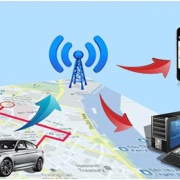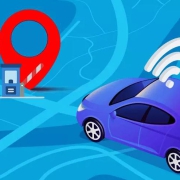What Does the Low Battery Alarm of a Car GPS Tracker Mean?
One of the most important functions of a car GPS tracker is its ability to accurately track and monitor the vehicle’s position. However, this function depends on the power on and normal operation of the device. In many cases, car GPS trackers rely on batteries to operate, and when these batteries run low, the device may trigger a warning called a “low battery alarm”.
So, what does this low battery alarm mean and why do drivers have to pay attention to it? In this article, we will carefully study the meaning of the low battery warning of the car GPS tracker and why it must be addressed immediately if such a warning occurs.
What is a low power alarm?
A low battery warning is a warning triggered when the battery level of the car GPS tracker reaches a certain level. This warning can take several different forms, depending on the specific equipment and manufacturer. However, some common indicators of low battery alarm include:
-Flashing LED lights
-Audible alarms, such as beeps or beeps
-Notification sent to connected smartphones or other devices
In most cases, the low battery alarm is to remind the driver that the battery in the GPS tracker is running out, and if no action is taken, the device may quickly shut down. Depending on the specific device, the low battery alarm can also provide an estimate of the remaining battery time, allowing drivers to better understand how much time they have before the device completely stops operating.
Why is low battery alarm important?
In the eyes of some drivers, a low battery warning may be a minor inconvenience. After all, if the GPS tracker is still working properly, why worry about a low battery warning? However, there are several important reasons why drivers should take the low battery alarm seriously and resolve it as soon as possible.
Firstly, and most importantly, the low battery alarm indicates that the GPS tracker may soon completely stop working. If the battery in the device is completely depleted, the device will no longer be able to provide position tracking or other functions. This may be a serious issue for drivers who rely on GPS trackers to navigate unfamiliar roads or monitor vehicle positions.
In addition, a low battery alarm may be an early warning signal for other issues with the device. For example, if the battery life of a GPS tracker remains low, it may be a sign that the device is experiencing excessive power consumption or other malfunctions. By addressing the low battery alarm as early as possible, drivers can potentially prevent more serious problems in the future.
Finally, the low battery alarm only reminds us to pay attention to the maintenance and upkeep of the car’s GPS tracker. Like any other electronic device, GPS trackers require regular attention and maintenance to ensure their normal operation. By paying attention to low-power alarms and taking measures to address them, drivers can help extend the lifespan of their equipment and ensure that they continue to provide accurate tracking and monitoring over the long term.
What can be done for low power alarms?
If drivers receive a low-power alarm on their car GPS tracker, they can take several steps to solve the problem and keep their equipment running normally. Firstly, the most important thing is to follow the manufacturer’s instructions and replace or charge the GPS tracker battery. This may involve purchasing a replacement battery or plugging the device into a charging port in the car or home.
In addition, drivers may need to consider adjusting the settings of the GPS tracker to reduce power consumption. For example, turning off unnecessary features such as 3G or Wi Fi connections can help extend battery life and reduce the frequency of low battery alarms. Similarly, reducing the brightness of the screen or adjusting the frequency of position updates can also help save power.
Finally, it is important to pay attention to the low battery alarm and take it seriously. Ignoring the warning or not handling it may lead to more serious problems with the device. By responding to low battery alarms in a timely manner and taking measures for long-term maintenance of equipment, drivers can ensure that their GPS trackers continue to provide reliable and accurate position tracking and long-term monitoring.
Low power warning is an important warning that drivers should take seriously when using the car’s GPS tracker. By understanding the meaning of low battery alarms and taking measures to address them, drivers can extend the lifespan of their equipment and ensure that they continue to provide accurate location tracking and monitoring for a period of time. Whether it involves replacing batteries, adjusting settings, or reducing power consumption, responding to low-power alarms is an important part of maintaining a reliable and effective car GPS tracker.








